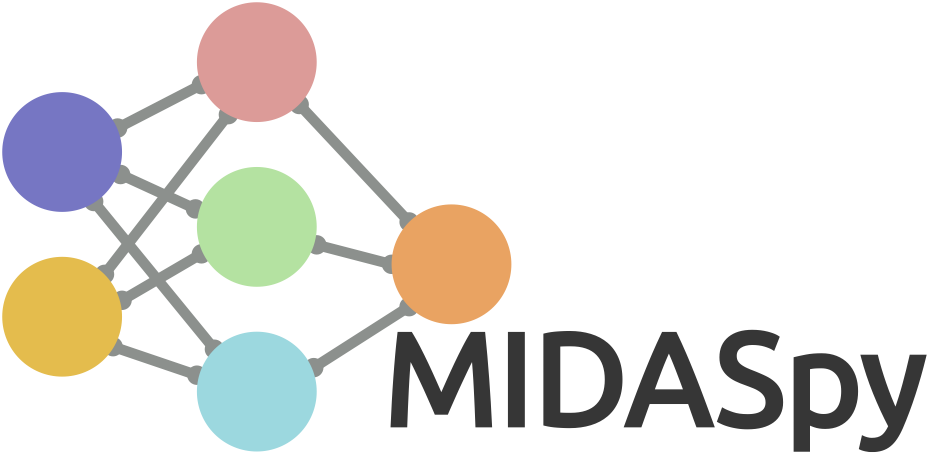MIDASpy is a Python package for multiply imputing missing data using deep learning methods. The MIDASpy algorithm offers significant accuracy and efficiency advantages over other multiple imputation strategies, particularly when applied to large datasets with complex features. In addition to implementing the algorithm, the package contains functions for processing data before and after model training, running imputation model diagnostics, generating multiple completed datasets, and estimating regression models on these datasets.
For an implementation in R, see our rMIDAS repository here.
For more information on MIDAS, the method underlying the software, see:
Lall, Ranjit, and Thomas Robinson. 2022. "The MIDAS Touch: Accurate and Scalable Missing-Data Imputation with Deep Learning." Political Analysis 30, no. 2: 179-196. doi:10.1017/pan.2020.49. Published version. Accepted version.
Lall, Ranjit, and Thomas Robinson. 2023. "Efficient Multiple Imputation for Diverse Data in Python and R: MIDASpy and rMIDAS." Journal of Statistical Software 107, no. 9: 1-38. doi:10.18637/jss.v107.i09. Published version.
To install via pip, enter the following command into the terminal:
pip install MIDASpy
The latest development version (potentially unstable) can be installed
via the terminal with:
pip install git+https://github.com/MIDASverse/MIDASpy.git
MIDAS requires:
- Python (>=3.6; <3.11)
- Numpy (>=1.5)
- Pandas (>=0.19)
- TensorFlow (<2.12)
- Matplotlib
- Statmodels
- Scipy
- TensorFlow Addons (<0.20)
Tensorflow also has a number of requirements, particularly if GPU acceleration is desired. See https://www.tensorflow.org/install/ for details.
For a simple demonstration of MIDASpy, see our Jupyter Notebook examples.
Interested in contributing to MIDASpy? We are looking to hire a research assistant to work part-time (flexibly) to help us build out new features and integrate our software with existing machine learning pipelines. You would be paid the standard research assistant rate at the University of Oxford. To apply, please send your CV (or a summary of relevant skills/experience) to [email protected].
- Minor update to reflect publication of accompanying article in Journal of Statistical Software
- Further updates to make documentation and URLs consistent, including removing unused metadata
- Adds support for Python 3.9 and 3.10
- Addresses deprecation warnings and other minor bug fixes
- Resolves dependency issues and includes an updated
setup.pyfile - Adds GitHub Actions workflows that trigger automatic tests on the latest Ubuntu, macOS, and Windows for Python versions 3.7 to 3.10 each time a push or pull request is made to the main branch
- An additional Jupyter Notebook example that demonstrates the core functionalities of MIDASpy
v1.2.3 adds support for installation on Apple Silicon hardware (i.e. M1 and M2 Macs).
v1.2.2 makes minor efficiency changes to the codebase. Full details are available in the Release logs.
v1.2.1 adds new pre-processing functionality and a multiple imputation regression function.
Users can now automatically preprocess binary and categorical columns prior to running the MIDAS algorithm using binary_conv() and cat_conv().
The new combine() function allows users to run regression analysis across the complete data, following Rubin’s combination rules.
Version 1.1.1 (October 2020)
Key changes:
-
Update adds full Tensorflow 2.X support:
-
Users can now run the MIDAS algorithm in TensorFlow 2.X (TF1 support retained)
-
Tidier handling of random seed setting across both TensorFlow and NumPy
-
-
Fixes a minor dependency bug
-
Other minor bug fixes
Version 1.0.2 (September 2020)
Key changes:
- Minor, mainly cosmetic, changes to the underlying source code.
- Renamed ‘categorical_columns’ argument in build_model() to ‘binary_columns’ to avoid confusion
- Added plotting arguments to overimputation() method to suppress intermediary overimputation plots (plot_main) and all plots (skip_plot).
- Changed overimputation() plot titles, labels and legends
- Added tensorflow 2.0 version check on import
- Fixed seed-setting bug in earlier versions
Alpha 0.2:
Variational autoencoder enabled. More flexibility in model specification, although defaulting to a simple mirrored system. Deeper analysis tools within .overimpute() for checking fit on continuous values. Constructor code deconflicted. Individual output specification enabled for very large datasets.
Key added features:
- Variational autoencoder capacity added, including encoding to and sampling from latent space
Planned features:
- Time dependence handling through recurrent cells
- Improving the pipeline methods for very large datasets
- Tensorboard integration
- Dropout scaling
- A modified constructor that can generate embeddings for better interpolation of features
- R support
Wish list:
- Smoothing for time series (LOESS?)
- Informative priors?
Alpha 0.1:
- Basic functionality feature-complete.
- Support for mixed categorical and continuous data types
- An “additional data” pipeline, allowing data that may be relevant to the imputation to be included (without being included in error generating statistics)
- Simplified calibration for model complexity through the “overimputation” function, including visualization of reconstructed features
- Basic large dataset functionality




